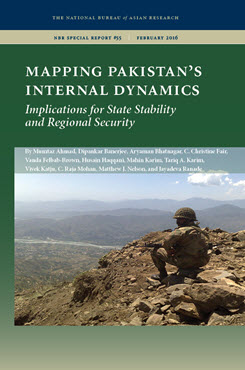Pakistan's Relations with Iran and the Implications for Regional Stability
This essay examines the deep history and complex modern dynamics of the relationship between Pakistan and Iran and argues that greater cooperation between the two countries could enhance regional integration and promote stability at a time of rising sectarian tensions in the Middle East and South Asia.
EXECUTIVE SUMMARY
MAIN ARGUMENT
Iran has deep cultural ties to South Asia, including modern-day Pakistan, forged by centuries of shared history. In recent decades, however, the two countries have frequently been on opposite ends of geopolitical and religious rivalries. Following the overthrow of the shah in 1979, Iran and Pakistan were no longer Cold War allies; instead, Shiite Iran has frequently viewed Pakistan as a partner of its Sunni archrival, Saudi Arabia. This conflict was exemplified in Pakistan’s and Iran’s support of opposing factions in the aftermath of the Soviet invasion of Afghanistan. In recent years, Iran’s overtures toward a partnership with India, as well as Pakistan’s security challenges and struggles with Sunni militancy, have led to a tense relationship between Islamabad and Tehran. Domestic political changes in both countries, however, combined with diplomatic efforts at reintegrating Iran into the international community, provide Pakistan and Iran with an opportunity to rebuild a relationship based on energy trade as well as security cooperation against dangerous militant groups. Such a partnership not only would benefit the two countries individually but could help build security and trade linkages in Central and South Asia.
POLICY IMPLICATIONS
- It is essential for the global war on terrorism that Iran, as home to the most important Shiite leadership, and Pakistan, where several radicalized Sunni groups appear to have established a widening beach-head, should engage with each other on security issues, using cooperation on energy as the gateway to expanding the space of mutual trust.
- Pakistan should revitalize efforts to proactively engage with India to find peaceful solutions to the long-festering disputes that have historically bedeviled relations between the two countries. This process could restore the positive engagement that historically had defined relations between Iran and the South Asian subcontinent.
- For the above to happen, however, other international actors, particularly the U.S. and the other permanent members on the UN Security Council, should work toward re-engaging with Iran and creating the enabling environment and conditions required.
Tariq A. Karim was Bangladesh’s High Commissioner to India from August 2009 to October 2015. Since November 2015, he has been an Adviser to the World Bank on regional economic integration in South Asia and resident in New Delhi, India, as a Distinguished Fellow in the Vivekananda International Foundation.


